Pulling the curtain off, the official UK launch of the MAN eTGX electric heavy-duty truck
By Luke Willetts - 6th August 2024
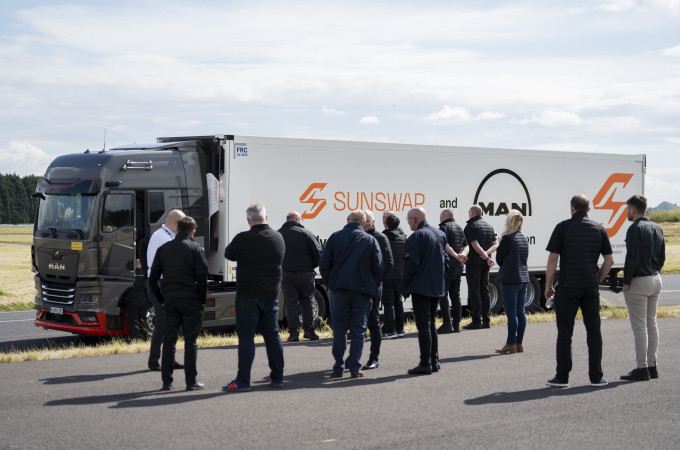
UK journalists gather at Horiba Mira for the eTGX test drive
UK / Germany – Last month, MAN Truck & Bus UK Ltd, based in Swindon (a subsidiary of the Traton Group based in Munich, Bavaria) invited journalists and select customers to test drive the new electric 18,5 tonne 4X2 long-distance eTGX prototype truck at the Horiba Mira proving ground in Nuneaton, UK. The truck had arrived directly from the MAN stand at the Road Transport Expo (RTX) show (4-6 June) at the NAEC Stoneleigh, in Warwickshire, UK. This new line of battery electric trucks for heavy-duty long-haul operations signifies MAN’s shift to e-mobility, as explained by Roger Turnbull, Head of EV Truck Sales at MAN UK, Turnbull told us that the order book is now open as the truck had recently gone into series production at the plant in Munich. The German manufacturer has already built 50 prototype vehicles and in 2025, production will be ramped up at the Munich plant.
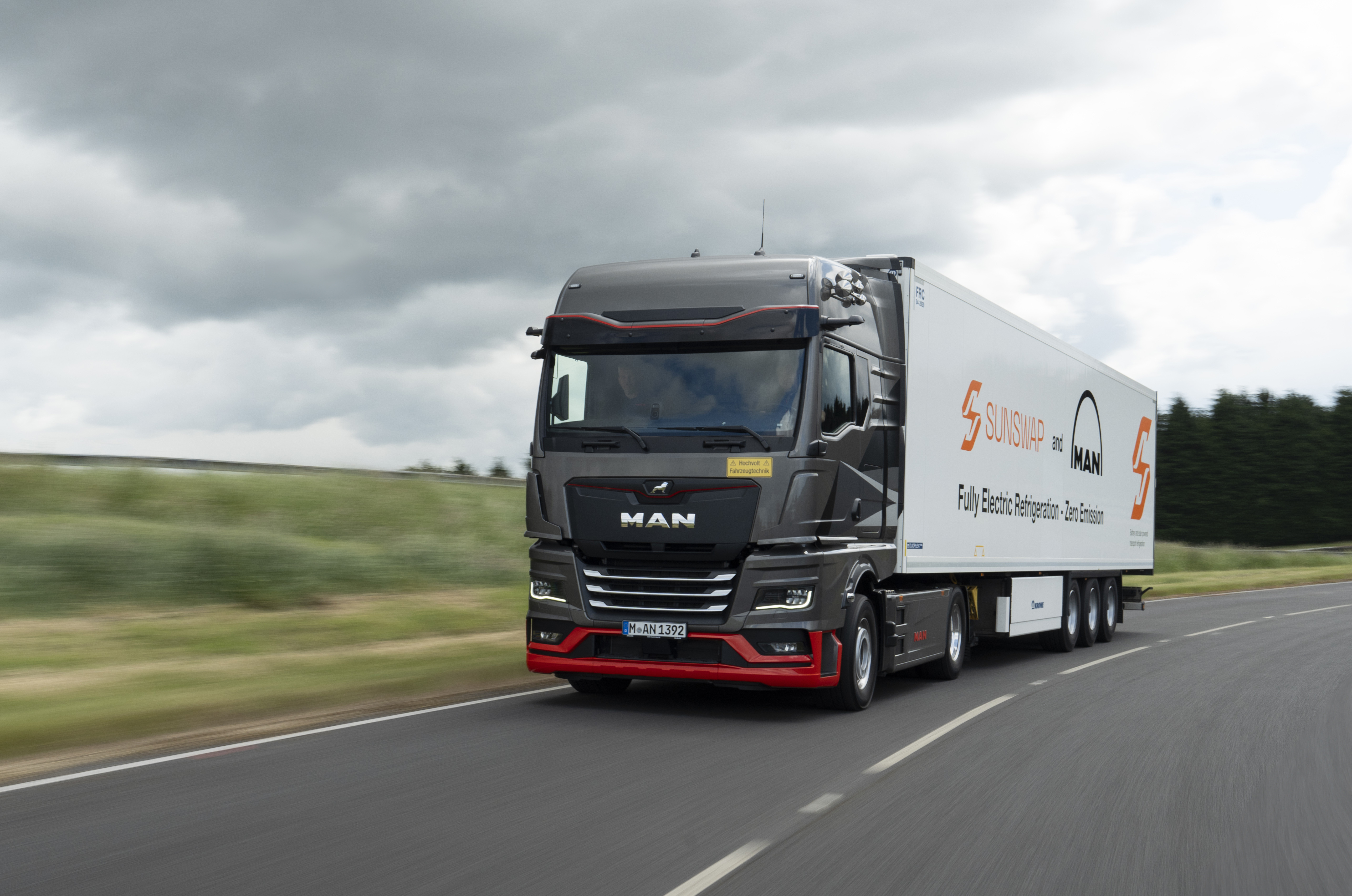
MAN eTGX
MAN electric truck range
The ‘eTGX’ and ‘eTGS’ (18 to 28-tonne) are a continuation of the longstanding TG-range of trucks, with electric drivelines that will reportedly deliver up to 800 kilometres of range, as a result of six battery packs (NMC) that provide a total capacity of 480 kWh. The 80 kWh NMC batteries are being produced in-house at the MAN plant in Nuremberg. The number of battery packs is customisable, one is central where the engine would be and the other is where the gearbox would traditionally sit. The rest of the batteries sit on either side of the chassis. Customers have the option of going down to three, four, or five packs in order to shed up to 2.4 metric tons from the total vehicle weight.
MAN has revealed further details of the electric powertrain, specifically its electric drive unit with integrated motor, inverter, and transmission. The customer may choose between three power ratings: 333 hp/254 kW, 449 hp/330 kW, or 544 hp/400 kW, with maximum torque ratings of 800, 1,150, or 1,250 Nm respectively. Depending on the power output, the transmission will come either as a 2-speed or a 4-speed. The electric drive system is centrally placed, as shown in the diagram below.
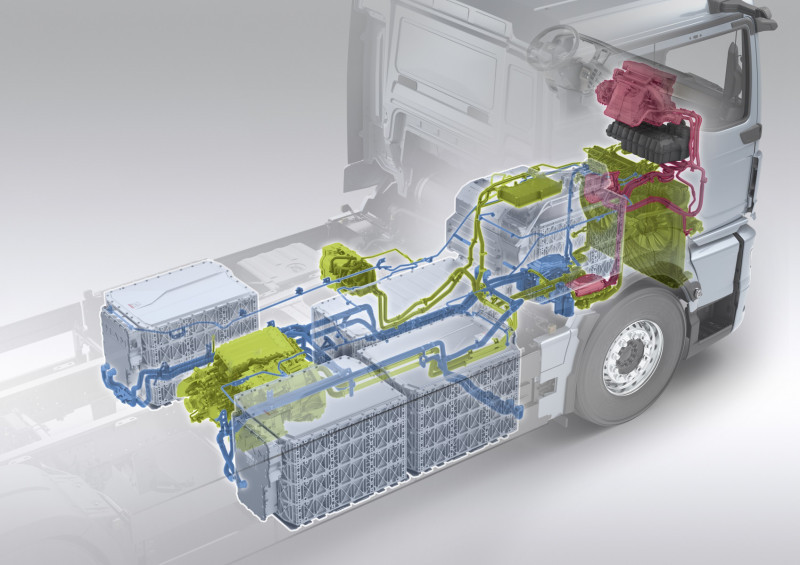
Diagram of e-powertrain layout
MAN is offering some flexibility in the design as well as the specification of its electric truck. The customer may add a mechanical auxiliary drive in the centre of the vehicle frame for driving hydraulic pumps and other equipment. The customer may also opt for a wheelbase as short as 3.75 metres, depending on the powertrain configuration. Removing and/or repositioning the batteries also frees up space for pumps, storage, crane outriggers, and other equipment underneath the vehicle.
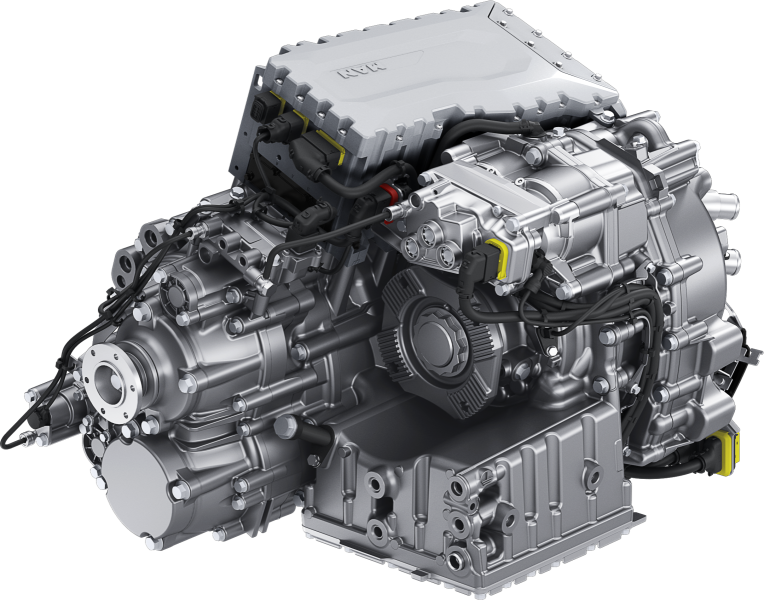
MAN electric drive system
The MAN e-trucks come with CCS charging up to 375 kW as standard, with a charging port on each side of the truck (either behind the front wheel arch or on the right-hand side of the frame at the rear). Customers may choose instead to replace one of these ports with a megawatt charging standard (MCS) for charging (initially) up to 750 kW.
Configurations
The company announced an expansion in the range of configurations available, with over one million variants that will be possible with the available options. MAN is now offering its ‘eTGS’ and ‘eTGX’ in a range of different rigid configurations for water, sewage, waste and raw materials management. MAN is touting the ‘eTrucks’ as the “ideal vehicle base” for applications in municipal and utility management, with a payload gain of up to 2.4 tonnes depending on the number of onboard batteries. The eTrucks will be offered in 4x2 and 6x2 axle configurations and a myriad of options affecting the wheelbase, the cab, the number of batteries, the battery pack layout, the position of the charging port, suspension, and so on. Customers may opt for between three and six battery packs, depending on their preference between payload and range. Power options include 333, 449, and 544 horsepower.
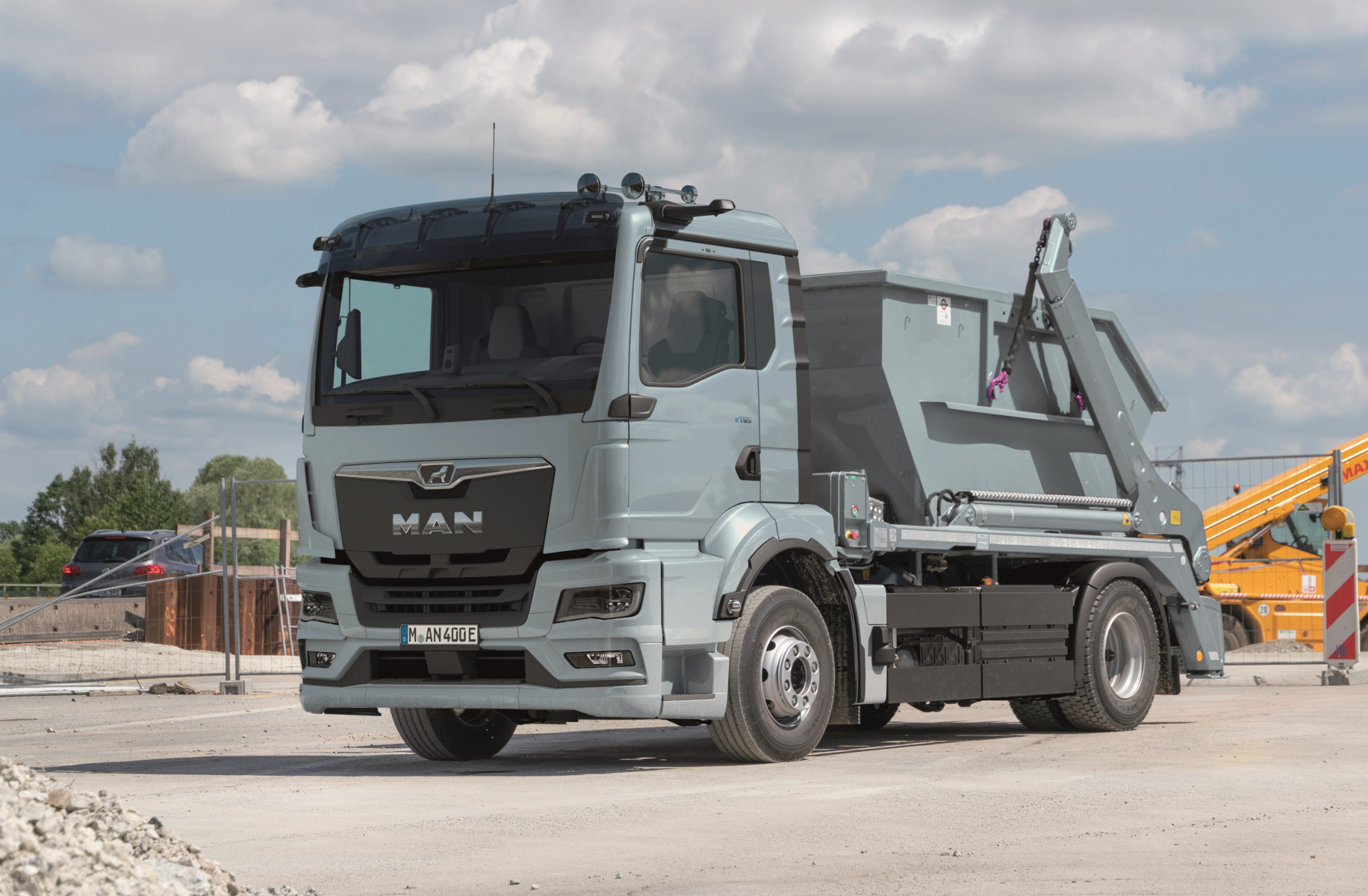
MAN eTGS with skip loader
MAN aftermarket
Turnbull was on hand to provide potential customers advice on choosing the correct vehicle configuration for their specific business needs. This falls under MAN’s ‘360 Degree eMobility Consulting’ service which also includes route analysis, charging infrastructure and fleet telematics services. MAN has partnered with ABB Ltd, Heliox B.V. (part of Siemens) and SBRS GmbH (part of the Shell Group) as official electric charging infrastructure partners. Truck purchases can be financed through the MAN finance department, which will not only finance the truck purchase but also aid in infrastructure and aftermarket services. Leases are also offered.
MAN localising battery production
In 2022 the Traton Group announced that it would begin assembling batteries for powering commercial electric vehicles at its plant in Nuremberg from mid-2023 onwards, with large-scale production to commence in 2025. Over the next several years, MAN plans to invest approximately EUR100m to prepare the Nuremberg facility for mass production of over 100,000 battery packs per year. From mid-2023, the batteries have been assembled on a small-series production line until the end of 2024, when construction of a large-scale production line is expected to be completed. The state government of Bavaria has also pledged funds – around EUR30m – to support research and development into battery assembly, cell chemistry, battery safety and battery recycling between 2023 and 2027. These investments supported the 350 employees at the Bavarian facility.
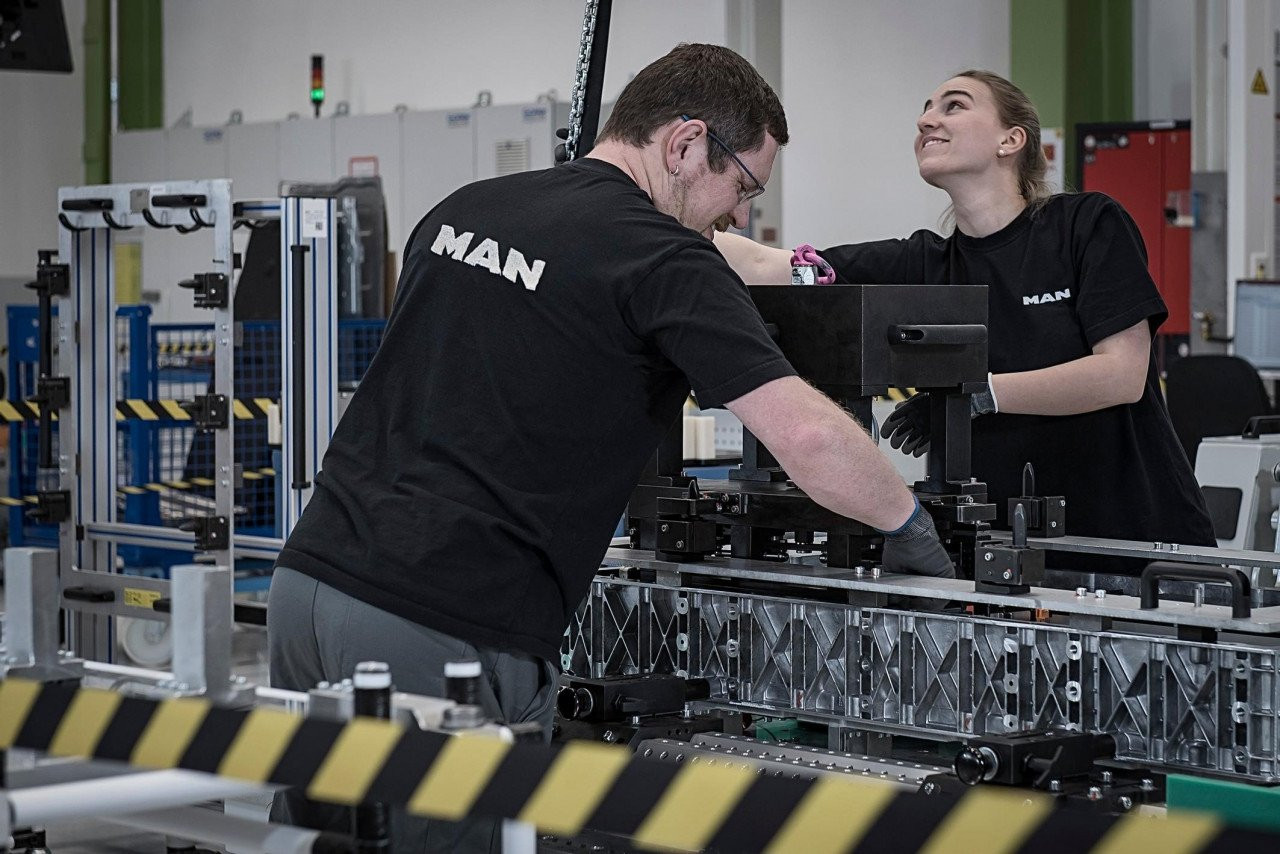
Battery assembly at the Nuremberg facility
Batteries developed in-house now power new MAN electric buses. Moreover, MAN states that investing in battery assembly will strengthen its role “as a competence partner for electromobility” within the Traton Group, suggesting that MAN batteries may also supply electric vehicles produced by fellow subsidiaries such as Scania, Navistar, and Volkswagen Caminhões e Ônibus.
Bridging the infrastructure gap
A recent industry report published in May 2021 by the European Automobile Manufacturers Association (Association des Constructeurs Européens d'Automobiles) has called for up to 15,000 high-performance public charging points by 2025, and up to 50,000 by 2030. Multiple agency bodies have decried the lack of electric charging infrastructure in Europe. This has been a major impediment to the large-scale uptake of electric trucks, according to ACEA (European Automobile Manufacturers’ Association), who state that different charging infrastructure for CVs is required due to the size of the vehicles, with at least one-megawatt power output to service demand. This necessary infrastructure would cost between USD50 and USD60 billion according to the World Economic Forum (WEF).
Over the last several years, both public and private institutions have laid out plans to tackle the critical infrastructure shortage. July last year saw the European Parliament pass the Alternative Fuels and Infrastructure Regulation Act. Under the law, charging stations (1,400 kW to 2,800 kW power outputs) for Commercial Vehicles will be placed every 120km along the EU’s main highways by 2028, whilst hydrogen refuelling stations will be installed at least every 200 km by 2031. Under the deal, each EU member state must commit to a mandatory minimum infrastructure target, presenting the European Commission with a roadmap to reach its goal.
In the private sector, a charging infrastructure joint venture (JV) between Traton SE, Daimler Truck AG, and AB Volvo called Milence plans to install and operate at least 1,700 high-performance charging points, supplied with renewable energy, on highways and at logistics hubs across Europe. Initially proposed in 2021, the JV, headquartered in Amsterdam, has received regulatory approvals and in 2022 appointed a CEO, Anja van Niersen. Each company has invested EUR 500 million, intending to encourage greater and swifter uptake of electric trucks in Europe.
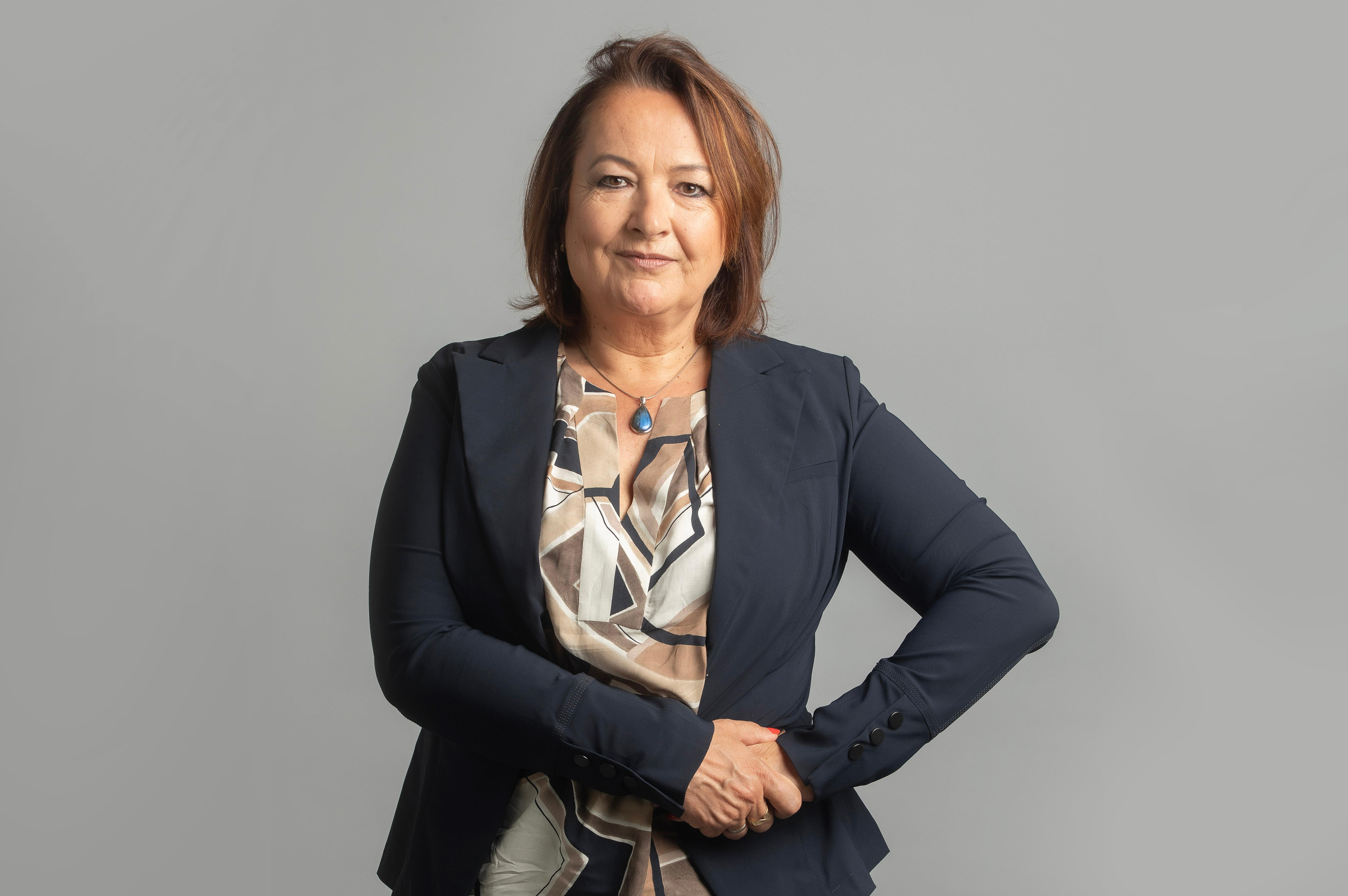
Anja van Niersen, CEO of charging network JV between Traton, Daimler Truck and Volvo
In January this year, Milence opened its first charging facility in the Netherlands and then rolled out charging stations in Belgium (the port of Antwerp). Charging stations in Sweden and France are currently being built with sites in Germany, Spain, Italy, Norway, and the UK to follow. In addition, Milence states that the number of charge points is expected to significantly increase with the intake of additional partners and public funding. Importantly, the charging network will be accessible to all commercial vehicles in Europe, regardless of brand.
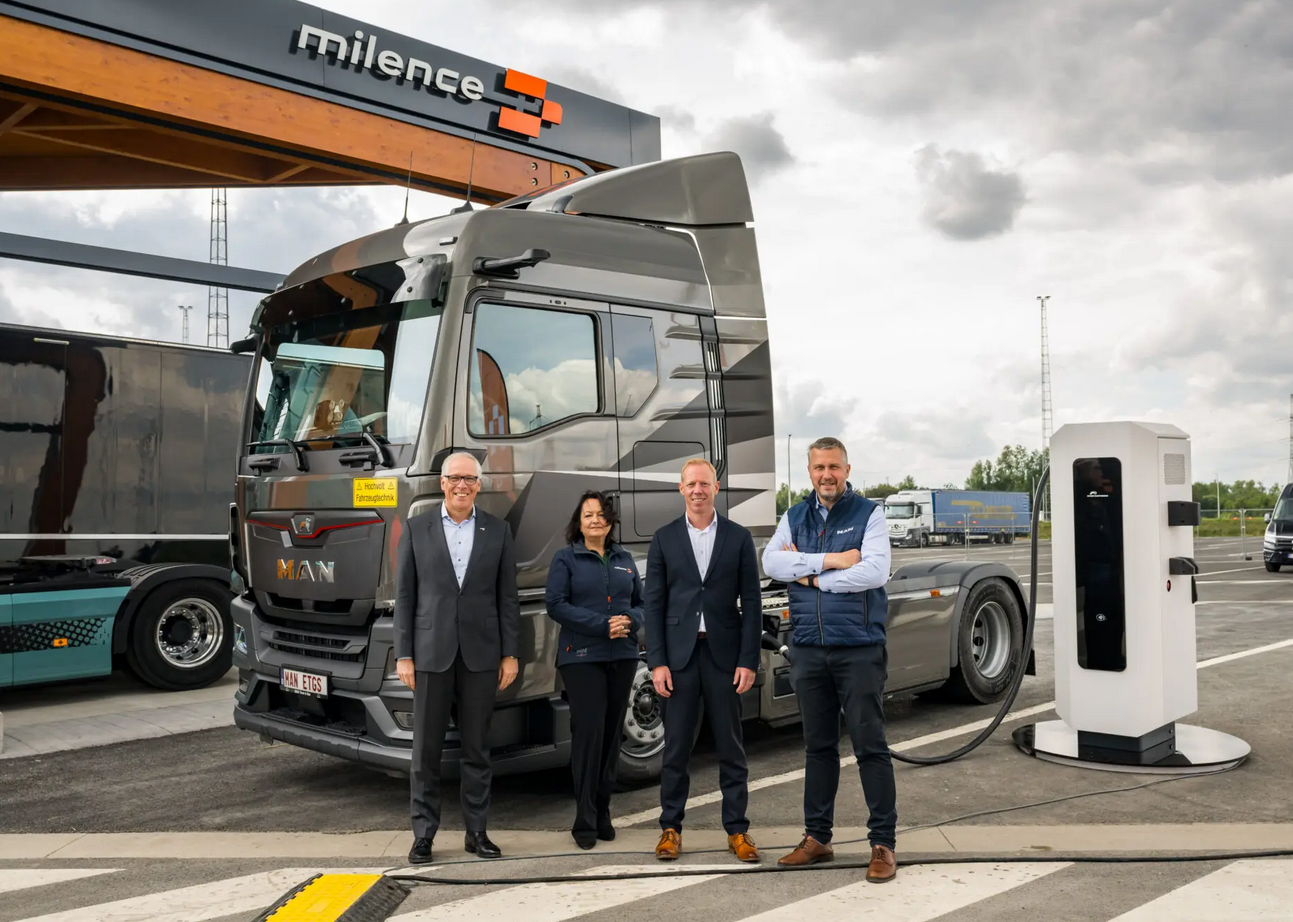
Opening of new truck charging park at the Port of Antwerp
Milence has been installing 400 kW CCS electric chargers with the intention of replacing them with megawatt charging systems which it claims would make it possible to charge a 40-tonne vehicle in 30-45 minutes during the driver’s mandatory break. Long haul trucks from Daimler and MAN compatible with fast charging are entering series production later this year. By combining their resources, the three competitors hope to achieve what, in the words of Volvo CEO and President Martin Lundstedt, “would be impossible for one actor alone to accomplish”. Volvo, Traton, and Daimler Truck have stated that the agreement represents a call to action for all other industry players, including governments and policymakers, to collaborate on expanding Europe’s charging network.
Christian Levin, CEO of Traton Group said:
We have the strong opinion that we as the TRATON GROUP together with our brands Scania and MAN as well as the commercial vehicle industry as a whole will be part of the solution when it comes to a CO2-neutral world. A collaboration with strong competitors like Daimler Truck and Volvo Group might seem unusual. However, the topic is of crucial importance and this unique cooperation will make us faster and more successful in delivering the transformational action needed to tackle climate change. Our joint venture will be a strong push for the rapid breakthrough of battery electric trucks and coaches, the most efficient and sustainable transport solutions.

Christian Levin, CEO of Traton Group


